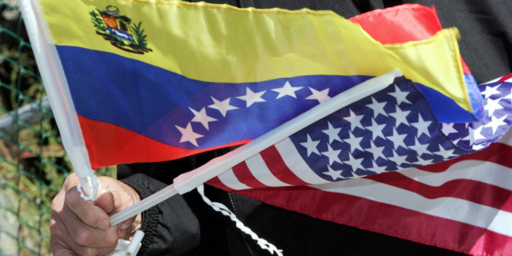More on Venezuela TV Situation
Cross-posted from PoliBlog:
Here is an interesting bit of video from Gallup World Poll on the RCTV situation in Venezuela:
Additionally:
- El Universal reports the following regarding Human Rights Watch’s response to the move by Chávez:
The Venezuelan government decision not to renew a broadcast license for private TV channel Radio Caracas Televisión (RCTV) endangers freedom of expression and is the result of political reasons, said Tuesday Human Rights Watch (HRW), Efe quoted.
President Hugo “Chávez is using improperly the state regulating authority to punish a media outlet due to criticism of the government,” said in a press release José Miguel Vivanco, executive director of the HWR Americas Division.
- Joel Simon, the Executive Director of the Committee to Protect Journalists has a letter of protest to Chávez regarding the RCTV closing. Here’s a key paragraph:
The threat of losing access to the airwaves hangs over dozens of other television and radio stations whose licenses have also come up for renewal, prompting some news outlets to pull back on critical programming, CPJ research has found. The RCTV decision also comes as your administration has moved aggressively to expand state media and amplify its voice.
h/t: iVory Towerz for the above, which has a very good post on the subject as well.
The following from Editor and Publisher is apropos: Freedom House: Press Liberty Declined Worldwide in ’06
Looking back over five years of its assessments of media liberty, Freedom House said, Venezuela “had suffered the largest single decline in media independence.” Venezuelan President Hugo Chavez, backed by a legislature packed with supporters, has changed laws to pressure independent newspapers and television stations, whom he regards as political enemies.
[…]
“The records of Venezuela and Russia are appalling, all the more so because of those countries’ impact on their regions,” Karin Karlekar, managing editor of the survey, said in a statement. “But we are also disturbed by the level of press freedom decline in what we had assumed were established democracies.”
Note that that paragraph is in the context of a global study.
Indeed, if we look at the 2006 Freedom of the Press report from Freedom House, we find that the country is categorized as “Not Free”. The first paragraph of that report is as follows:
A hostile political atmosphere under the government of President Hugo Chavez has continued to affect the largely pro-opposition private media. One result has been a steady decline in press freedom over the past several years-a trend that continued in 2005-reflected in the government’s enactment of legislation prohibiting the broadcast of certain material, its intimidation toward and denial of access to private media, and the continued harassment of journalists, directed primarily at those employed by private media outlets.
For those interested in this situation, the whole thing is worth reading.



I wonder if Danny Glover/Cindy Sheehan/Harry Belafonte would hug him for this little bid of controlling the media.
Drezner nails why this is the beginning of the end for Chavez:
In a war between Hugo Chavez and the telenovela, I’ll take the telenovela every day of the week and twice on Sundays.